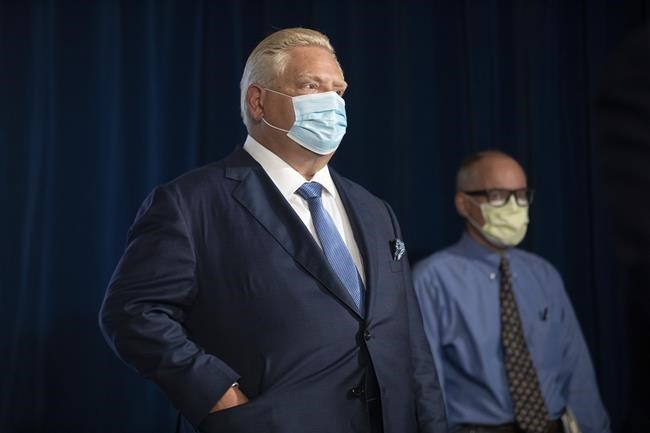TORONTO — All eligible adults in Ontario can book COVID-19 booster shots starting Monday, part of an accelerated rollout of third doses the premier is touting as the centrepiece of the province's response to the highly infectious Omicron variant.
Premier Doug Ford called on business owners to offer spaces for clinics and asked medical professionals to participate in the ramped-up booster efforts. He also asked that individuals book shots as soon as they're able in the face of the new variant.
"We will go after this variant with everything we have," Ford said at a news conference Wednesday. "It starts with booster shots. Nothing matters more than getting these third shots into arms."
The government will also cut capacity to 50 per cent at certain large venues, including sporting arenas and cinemas, and is distributing free rapid tests to residents in certain high-traffic public settings.
Dr. Kieran Moore, the province's top doctor, has said that Omicron is infecting between four and eight times more people than the Delta variant. He has also said it appears to infect more vaccinated people and that third doses offer greater protection.
Ford said Wednesday that the variant may already be dominant in Ontario.
"But let me be clear: just because this new enemy is on the offence, does not mean we can sit back and play defence," he said.
The province said large companies will help run workplace and community clinics and some settings like pharmacies can start offering walk-in boosters to anyone 18 and older as of Friday.
Eligibility for boosters was shortened from six months to three months – or 84 days – from a person's second vaccine dose. That time frame will apply to all newly eligible people.
Anyone who was already eligible for boosters at the longer dose interval can now move appointments up to three months since their second dose.
Ford said the province is aiming to reach a capacity of up to 300,000 vaccinations per day. Health units have said they are diverting public health staff from other work to help with the efforts.
The president of the Ontario College of Family Physicians asked members to dial back on non-urgent work to help with vaccinations, and the CEO of the Ontario Pharmacists Association said pharmacists had been asked by the Health Ministry to extend their hours over the holidays.
The province also announced that starting Saturday, it would cap crowds at 50 per cent for indoor venues with capacity greater than 1,000 people, including sports facilities, theatres and concert spaces.
Wednesday's announcement stopped short of bringing in further restrictions in other settings including restaurants and private gatherings, which a group representing local public health units had called for earlier in the week.
Dr. Peter Juni, one of the top experts advising the province on the science of COVID-19, said if Ontario continues on its current trajectory, there will likely be more than 10,000 new cases a day by Dec. 31.
To protect against the spread, he said the province must bring in new public health measures, including restricting capacity at restaurants and sports arenas, and individuals must keep their gatherings "small and intimate," with just five or six people present.
Ford said Wednesday that "locking down" wouldn't stop the variant, but that addressing settings where large crowds gather without everyone wearing masks was the priority for restrictions – though he added that "everything is on the table" as the situation evolves.
A handful of public health units had already introduced smaller capacity limits on businesses and gatherings. In Simcoe-Muskoka, the region's top doctor said Wednesday he would reintroduce 50 per cent capacity limits on bars and restaurants, event spaces, indoor sports facilities, religious services and limits on gatherings by Dec. 20, if the province didn't do so first.
Dr. Charles Gardner said he was aware of similar restrictions being discussed at the provincial level, but waiting longer than a week wouldn't be fast enough to keep up with the rate of transmission.
"I'm prepared to proceed with it in this week, if we have to," he said.
Also on Wednesday, the province launched its holiday testing effort to distribute two million rapid tests at pop-up sites in high-traffic settings like libraries, malls, transit hubs and liquor stores. Most of the settings listed on a government website as of Wednesday were in the Greater Toronto Area.
Meanwhile, some experts and local health officials including Gardner warned that the coming wave of Omicron cases would likely overwhelm capacity to conduct tests for all suspected COVID-19 cases and contacts – a challenge that was already playing out in Kingston, Ont., this week, where Omicron is known to be circulating.
Moore said if testing capacity is maxed out, PCR tests will be reserved for people with active symptoms, particularly those in congregate settings like schools, correctional facilities, long-term care or hospitals.
For others, Moore said the province is planning to supplement testing capacity with rapid antigen tests, which are different from the gold-standard PCR tests but easier to administer, with results within 15 minutes.
- With files from Nicole Thompson
This report by The Canadian Press was first published Dec. 15, 2021.
Holly McKenzie-Sutter, The Canadian Press
Note to readers: A previous version of this story had an incorrect date for when capacity limits on certain large venues will take effect.

